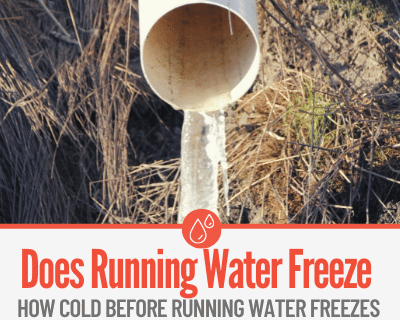Wondering if leaving water Running or Dripping can prevent frozen pipes? What exactly does it take to Freeze Running water?
In this guide you will learn:
- If Running water can actually freeze & How cold does it have to be,
- Should you leave Water Running to Prevent Burst pipes & Water Damage,
- Other ways to Prevent Frozen Pipes in your home.

When it comes to cold weather months, a common issue many homeowners face is freezing pipes. When this occurs, freezing pipes can often burst, leading to huge water damage and a number of other issues.
Does Running Water Freeze?
The short answer is, “not easily.” Water possesses the somewhat unique property of being denser in liquid form than in solid, so when pressure is applied the freezing temperature of water actually lowers.
As a result, running water is capable of reaching sub-zero temperatures without actually freezing. So while it isn’t entirely impossible for running water to freeze, running water takes lower temperatures to freeze and longer time than standing water.
Of course, this also depends on what exactly is in the water to begin with. Things like additives & minerals that alter the water’s chemical composition can have an effect as well, For example, Seawater Freezes at 28F.
So while it is still possible for running water to freeze at 0 degrees Celsius / 32 Degrees Fahrenheit, For all intents and purposes the general consensus is that running water freezes between 0 and -10 degrees Celsius. (32-14 Fahrenheit )
If there is a small constant Drip of water and the temperature fluctuates to no less than -5c /23 F the water will be able to mix enough and it shouldn’t freeze in the pipes for some time.
If the outside temperatures get below -10c (14 Fahrenheit) only a very large stream of warmer water won’t freeze. Still, with time frozen water crystals will start to form which can freeze even the largest streams.
All This will depend on factors like how fast it’s running, the volume of the water and the chemical composition of the water itself.
Can Pipes Freeze With Water Running
While it is still technically possible for pipes to freeze with water running, leaving your water running or dripping helps considerably in preventing your pipes from freezing.
Similarly, if you have a sump pump in your basement, water running through it will help prevent the sump pump line and the sump pump it self from freezing as well. This will prove to be crucial when snow begins to melt, and could wind up flooding your basement if your pump has frozen over.
Pipes are much less likely to freeze with water running, and when temperatures drop significantly you’ll need to do everything you can to safeguard them from cold temperatures.
Water Damage from Burst Pipes?
Call 844-488-0570 for a Risk Free estimate from a Licensed Water Damage Restoration Specialist in your area.
We Can Help deal with Water, Repair any Pipes & Water Damage Caused.
Leaving Water Running/Dripping To Prevent Frozen Pipes
By leaving the water running during cold weather, the increase in pressure means the ambient temperature outside the pipes will have to be lower than normal for the water inside to freeze.
If you’re expecting a severe drop in temperatures overnight, or if you’re going to be away from your home for a while, even just a steady dripping water can make the difference between a slight increase in your water bill, or costly repairs when your pipes burst.
How To Leave Water Running So Pipes Don’t Freeze
Generally speaking, the best way to go about leaving your water running is a slow, steady drip of cold water.
Using warm or hot water sounds good in theory, but ultimately won’t make enough of a difference to make an impact.
Not to mention, you should be shutting down and winterizing your hot water heater if you’re going to be gone for an extended period of time.
At least one faucet is necessary for the process, but if there are multiple faucets around the home it wouldn’t hurt to turn them on to a slow trickle as well.
A slow, steady drip at numerous points throughout the house will keep water moving, and help prevent pipes from freezing and bursting.
Other Ways To Prevent Frozen Pipes
Other things you can do to help include (but aren’t limited to):
1.Leave your cupboards open
If you have Pipes running Inside/behind your cupboard leaving your cupboards open helps keep the air inside them circulate, this can prevent water in the pipes inside from freezing and causing water damage.
2.Insulate your pipes
Using simple things like pipe sleeves can help keep the water inside from freezing.
See our Guide here on how to Winterize Your Plumbing & Pipes.
3.Leave your thermostat on
If you are going away for a couple of weeks it’s wise to leave the heat in your home to the minimum possible setting to prevent the home from becoming too cold and pipes bursting. Set it no lower than 41-45 Degrees Fahrenheit (5-7c).
It’s considerably cheaper to leave the heat in your home on than dealing with water damage from burst pipes.
4.Use drain-safe antifreeze in your drains
Using a small amount of RV antifreeze (with propylene glycol) can massively help prevent water from freezing in your drains.
We have Water Damage Restoration Technicians that can help Repair Burst Pipes & Repair any Water Damage Caused.
For Disasters of all Sizes,available in 95% of the USA
